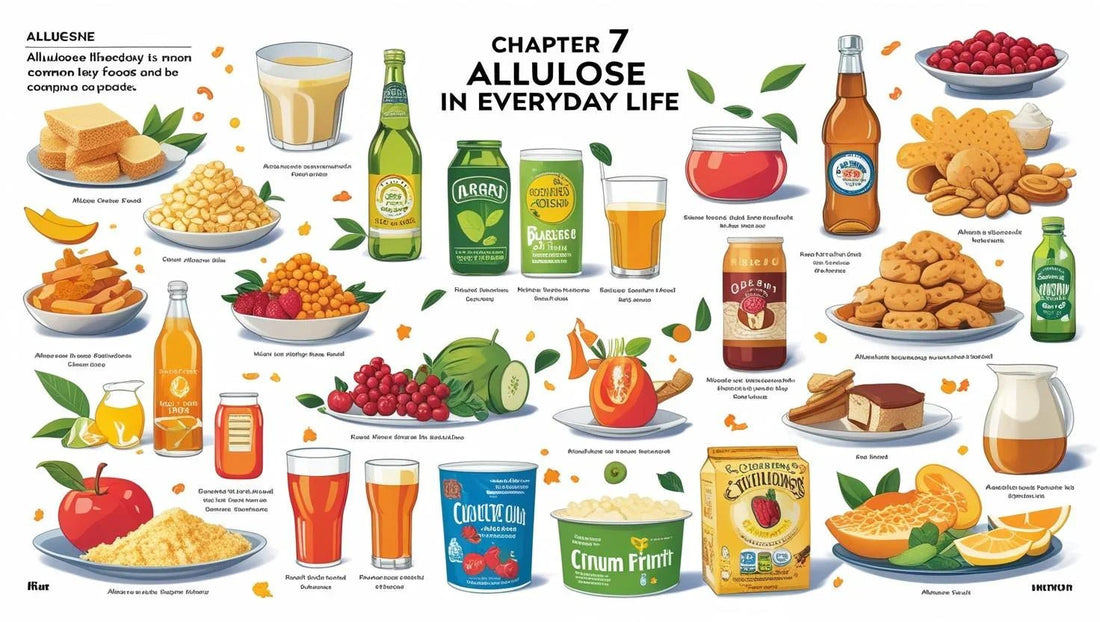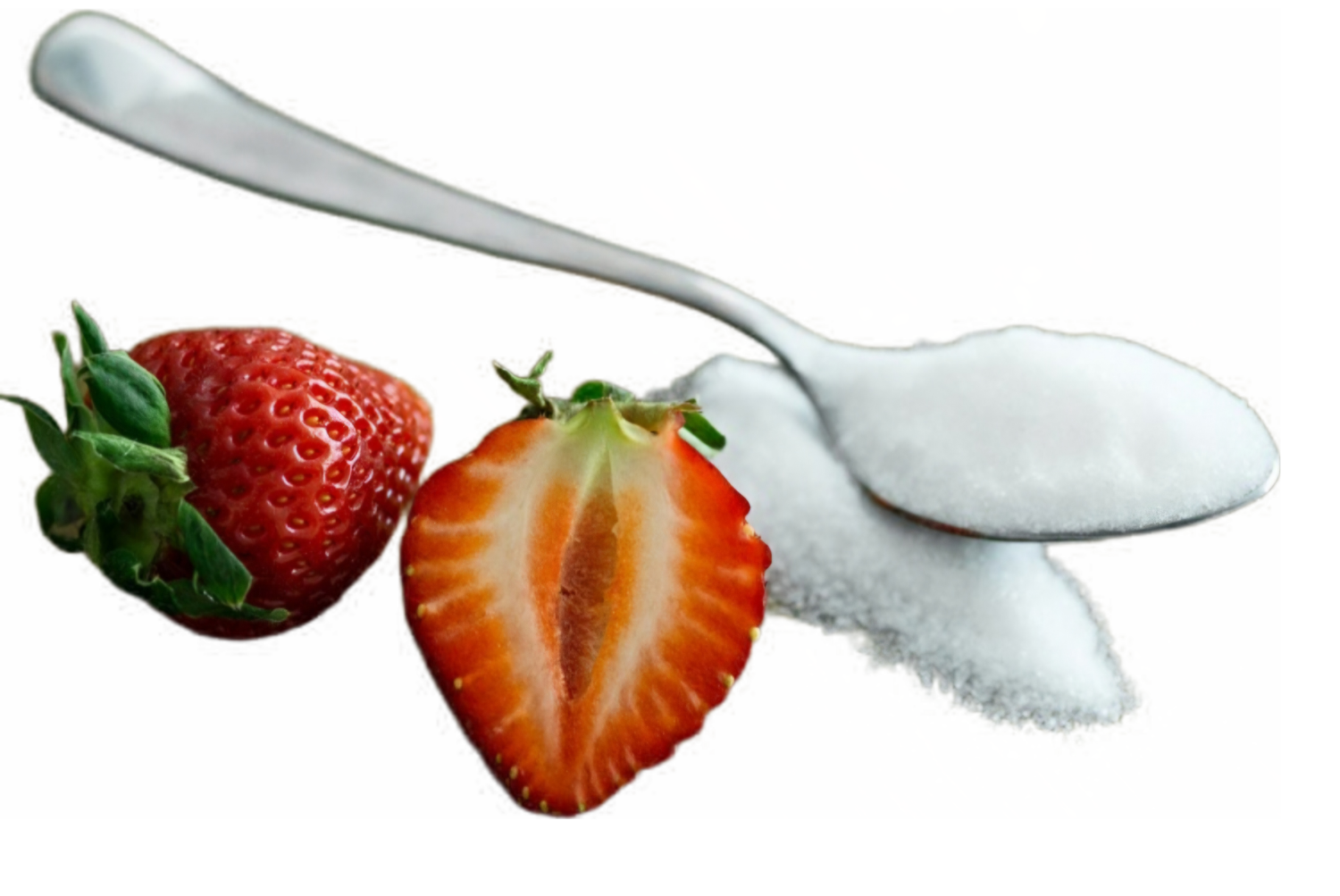
Chapter 7: Allulose in everyday life
Allulose StoreAllulose is an increasingly popular natural sweetener, increasingly sought after as a sugar substitute for both home and industrial use.
In this chapter, we will show you how to choose reliable allulose, what to look for when buying, how to store it, what forms it is available in, and what we can expect in terms of price-value ratio, as well as an overview of the Hungarian and international market situation.
The origin and production of allulose – what makes it natural?
Allulose is a “rare sugar” that is naturally found in small amounts in foods such as figs, raisins, kiwi, brown sugar, and maple syrup.
However, commercially available allulose is typically produced from corn starch by enzymatic conversion.
Although the process is technological, the raw materials are of natural origin, so allulose is considered a natural sweetener.
Types of allulose: powder, granules, liquid and mixtures
Consumers can encounter allulose in several forms.
• Powdered allulose
A fine, white crystalline powder that dissolves easily in drinks, creams, and icings. This is the most popular version, especially for home use.
• Granulated allulose
It has a grainy, crystalline texture, reminiscent of traditional sugar. Ideal for baking, cooking, and baked goods.
• Liquid allulose
Available in syrup form, it is suitable for sweetening drinks, sauces and dressings.
• Allulose mixtures
Products combined with other sweeteners (e.g. erythritol, fibers) to achieve a desired sweetness level, texture, or functional benefit.
Which is best? The choice depends on the method of use: liquid allulose is recommended for drinks and sauces, while granulated or powdered allulose is recommended for baking and cooking.
Quality considerations – what should we pay attention to when buying?
• Cleanliness
Food-grade allulose is usually over 99% pure, which is verified by HPLC.
• Certificates
Reliable manufacturers have ISO, HALAL, KOSHER, FDA, USDA, EU organic certificates.
• Packaging
Good quality allulose comes in airtight packaging, foil bags or paper drums, protected from light and moisture.
• Warranty period
With proper storage, it retains its quality for 2 years.
• Origin
Most allulose comes from China, the USA, South Korea or Japan.
Storage and shelf life
Allulose should be stored in a cool, dry place, protected from light and heat, in tightly sealed packaging.
Moisture, sunlight and high temperatures can deteriorate the quality, cause clumping, and change the color or taste.
• Ideal storage
Pantry, closed glass or box.
• Usability
It can be stored for 2 years under appropriate conditions.
Value for money and packaging
The price of allulose is higher than that of traditional sugar or even erythritol, but for health-conscious consumers, it may pay off in the long run.
Prices depend on the manufacturer, purity, and packaging.
Specialty food stores
In some countries, there are organic stores, stores selling healthy foods.
In Hungary
Currently, allulose can mainly be ordered from foreign online stores, as it is not yet approved as a food ingredient everywhere in the EU.
Tips for everyday use
• Baking and cooking
Allulose can replace sugar in a 1:1 ratio, but its sweetening power is about 70%, so it is worth using a little more to achieve the desired sweetness.
• Drinks
It dissolves quickly in coffee, tea, lemonade, and smoothies, leaving no aftertaste.
• Icing, creams
Powdered allulose is perfect for making frostings, mousses, and creams.
• Making syrup
By boiling 1 cup of allulose + 1/4 cup of water, you can make a homemade syrup that can be used in drinks, pancakes, and desserts.
• Combination with other sweeteners
When mixed with erythritol, stevia, and fiber, a more complex flavor, better texture, and lower calories can be achieved.
Daily dosage, safety and side effects
• Recommended daily amount
The FDA has not set an upper limit, but a general recommendation is that consuming 0.4 g of allulose per kilogram of body weight is safe, e.g. for a 70 kg adult, about 28 g/day.
• Tolerance
Allulose is well tolerated, but in large amounts (especially all at once) it may cause bloating, gas, or diarrhea, similar to other sugar alcohols.
• Children, pregnant women
There are no contraindications, but moderation is recommended.
• Allergy
It is rare, but it can happen, especially if the product is contaminated or contains additives.
Value for money, market trends and availability
The demand for allulose is growing rapidly worldwide, with the global market expected to reach $450 million by 2030, growing at a compound annual growth rate of over 9%.
It is already widely available in the USA, Japan, and South Korea, and is even more limited in the EU due to regulations, but based on trends, it is expected to be available in more and more countries.
Benefits in everyday life
• Low calorie content, no glycemic effect.
• Clean, sugar-like taste, no aftertaste.
• Wide range of uses (baking, drinks, sweets).
• Good value for money, especially in larger packages.
Summary – practical advice for buyers
Choose a reliable, qualified manufacturer!
We check purity, certificates, packaging.
Choose a form according to the purpose of use: liquid for drinks, granulated or powdered for baking.
Store in a dry, cool place, protected from light! This way it will retain its quality for 2 years.
Start with a smaller amount and watch your body's reactions! Larger amounts may cause digestive complaints.
Combine with other sweeteners if you want a more complex flavor or texture!
Allulose is an increasingly available, safe, versatile sweetener that offers the pleasure of sugar without the negative effects - a conscious choice for health-conscious consumers.

